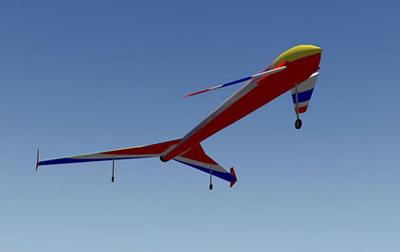Southampton engineering students design first-ever 3D-printed, rocket-powered space plane

Postgraduate aeronautical design students from the University of Southampton have designed the world’s first-ever 3D-printed, rocket-powered space plane.
The Low Orbit Helium Assisted Navigator (LOHAN) mission is an audacious plan to launch Vulture 2, a 3D printed rocket-powered space plane, into the stratosphere at three times the cruising altitude of a transatlantic jet.
The Vulture 2 will rise to an estimated launch altitude of 20,000m under a carbon fibre launch structure lifted by a helium-filled meteorological balloon. Once the rocket motor fires – courtesy of a custom-built electronic igniter board – the aircraft will soar to a heady 25,000m, after which the Vulture 2 will glide back to earth under autopilot control.
The British team – headed up by technology magazine The Register’s Special Projects Bureau – will launch what is arguably the world’s most advanced amateur UAV (unmanned aerial vehicle, also known as a stratospheric drone) at the home of Virgin Galactic - Spaceport America, New Mexico, in the coming months.
The Vulture 2 was designed by post-graduate aeronautical design students Amrith Surendra, Chris Dodd and David Cooper, and produced with industrial-scale 3D printing equipment. The avionics are an advanced mix of 3D robotics autopilot and British-built Raspberry Pi. Between them, they will use GPS, airspeed and other telemetry to navigate the Vulture 2 back to a predetermined landing site. Cameras will record the entire flight from ascent, through to blast-off, and on to landing.
Amrith Surendra, one of the students who designed Vulture 2, said: “Being involved in the design of Vulture 2 has been an amazing learning experience. It gave us the opportunity to apply our knowledge to explore new ideas and come up with a truly revolutionary design. Working on this project has allowed me to appreciate level of precision and ingenuity that is required to create a system of this nature, and has undoubtedly peaked my interest in pursuing a career in the aerospace industry after my doctoral studies.”
Lester Haines, head of the Register’s Special Projects Bureau and holder of the Guinness World Record for the highest launch of a paper aeroplane, said: “Without doubt, this is the most complicated amateur high-altitude mission ever undertaken. We’ve spent four years, thousands of hours and quite a bit of cash overcoming numerous technical challenges, and we’re delighted that EXASOL has come on board for the grand finale. We don’t know quite what will happen when the big day arrives, but one thing’s for sure – it’s going to be quite a show.”
Aaron Auld, CEO of database management software company EXASOL, who are the lead sponsors of the project, said: “When we heard about The Register’s plan to launch the Vulture 2, we thought it was only fitting that the world’s fastest in-memory analytic database, EXASolution, should support this fascinating venture. EXASOL strongly believes in innovation, so this spoke to our core philosophy. We are all about pushing boundaries and just as EXASolution pushes speed and performance benchmarks to become the world’s best, so does The Vulture 2.”
Ends
Notes for editors:
1. Images and videos of Vulture 2 are available from Media Relations on request.
2. EXASOL was founded in 2000 with the simple goal to engineer the world’s fastest database for analytics and data warehousing. It helps companies across the globe, from start-ups to established global companies, manage their data in real-time helping to grow their business and drive profit. Its ground breaking in-memory analytic database product, EXASolution is the first ever database to combine in-memory, columnar compression, and massively parallel processing that is proven to be the world’s FASTEST, topping the list in every TPC-H Benchmark test for performance. Leading global companies using EXASolution to run their businesses faster and smarter include: Adidas Group, GfK, IMS Health, King, Olympus, myThings, Sony Music and Xing, among others. Follow EXASOL on Twitter at @EXASOLAG
3. Through world-leading research and enterprise activities, the University of Southampton connects with businesses to create real-world solutions to global issues. Through its educational offering, it works with partners around the world to offer relevant, flexible education, which trains students for jobs not even thought of. This connectivity is what sets Southampton apart from the rest; we make connections and change the world. https://www.southampton.ac.uk/
https://www.southampton.ac.uk/weareconnected
#weareconnected
For more information:
Glenn Harris, Media Relations, University of Southampton, Tel 023 8059 3212, email G.Harris@soton.ac.uk, Twitter: @glennh75
https://www.southampton.ac.uk/mediacentre/
Follow us on twitter: http://twitter.com/unisouthampton
Like us on Facebook: www.facebook.com/unisouthampton